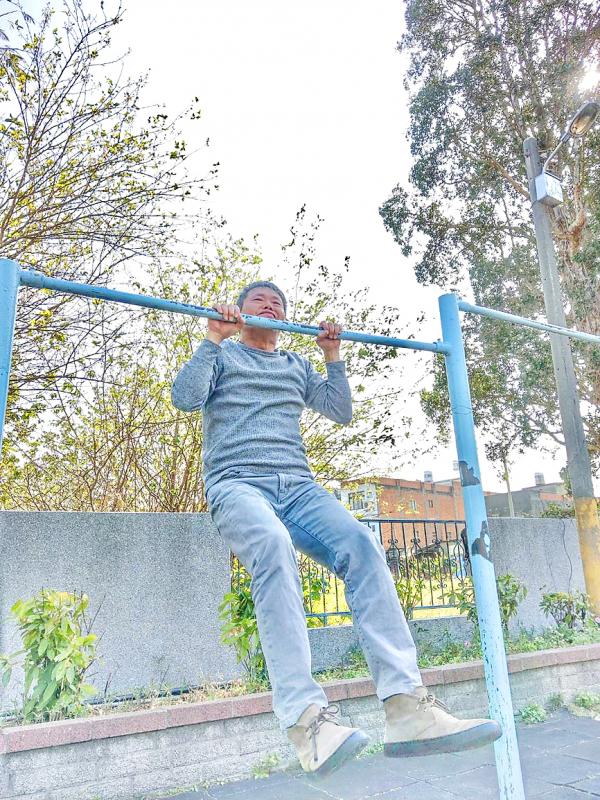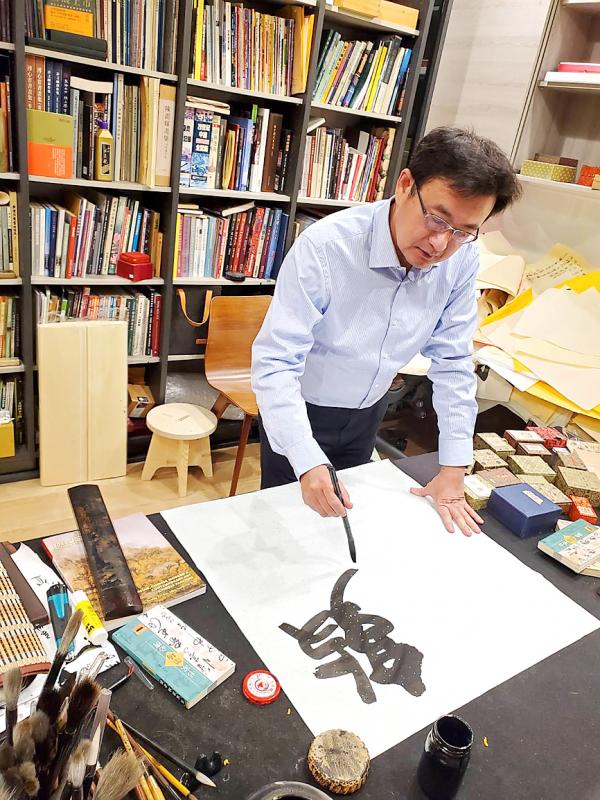Many legislators hide a special talent behind their serious public demeanor, whether it be a passion sparked in childhood or one of many skills explored before holding office.
Despite his wiry frame, Chinese Nationalist Party (KMT) Legislator Lin Wei-chou (林為洲) is stronger than he looks, and has the credentials to prove it.
Years ago, Lin was an arm-wrestling champion, winning fourth place in a national competition during college.

Photo: Chen Yun, Taipei Times
Now 59 years old, the KMT heavyweight said he discovered his extraordinary strength at an early age.
When growing up he could always beat his opponents, even though he was neither tall nor particularly brawny, he said, adding that no one could overtake him throughout grade school and he eventually became the top competitor in Hsinchu County.
While he was in college, a beer importer organized an arm-wrestling competition to promote its entrance into the Taiwanese market.

Photo courtesy of Huang Kuo-shu’s office
Regardless of his lack of training or conditioning, Lin said he entered to test his mettle against nearly 100 other competitors.
The young Chinese-language major faced off against bodybuilders and personal trainers, overcoming most of them to win fourth place, along with a crate of beer and a few thousand New Taiwan dollars.
When not in the legislature, KMT Legislator Wu I-ding (吳怡玎) likes to spend her time in the kitchen preparing exquisite meals with knowledge obtained in part from the French culinary school Le Cordon Bleu.
Her love of cooking began in her fourth year of college while she was on exchange in Vancouver, where she learned from the spouses of doctoral candidates living in her dorm, Wu said.
She left her first job in private equity during the financial crisis in 2008, and took the opportunity to apply to Le Cordon Bleu in London.
After three months of study, Wu passed the basic cuisine certification exam with a nearly perfect score, only losing points for forgetting to remove the toothpicks from her fish roll.
She then returned to the world of finance, and after a decade moved to Shanghai, where she had originally envisioned opening a dumpling restaurant.
With all of the preparations completed and poised to sign for a storefront, Wu’s plans were sidetracked by licensing difficulties and her newly discovered pregnancy.
She returned to Taiwan in 2018 to give birth and only then stumbled into politics.
“I still have not forgotten that dumpling dream,” she said. “Maybe one day I will open a restaurant.”
For Democratic Progressive Party (DPP) Legislator Huang Kuo-shu (黃國書), calligraphy has been a lifelong passion starting from elementary school.
Aside from the calligraphy covering the walls of his office, Huang is next month to become the first legislator to stage a solo exhibition in the Legislative Yuan art gallery, while in October, the National Sun Yat-sen Memorial Hall in Taipei is to display 100 of his works.
Among the pieces to be displayed next month are the lyrics of the song Happiness for the World (樂為世界人), which democracy pioneer Chiang Wei-shui (蔣渭水) wrote for the Taiwanese Cultural Association.
The piece is meant to emphasize Taiwan’s determination to participate in global movements and connect with the world, Huang said.

SHIPS, TRAINS AND AUTOMOBILES: The ministry has announced changes to varied transportation industries taking effect soon, with a number of effects for passengers Beginning next month, the post office is canceling signature upon delivery and written inquiry services for international registered small packets in accordance with the new policy of the Universal Postal Union, the Ministry of Transportation and Communications said yesterday. The new policy does not apply to packets that are to be delivered to China, the ministry said. Senders of international registered small packets would receive a NT$10 rebate on postage if the packets are sent from Jan. 1 to March 31, it added. The ministry said that three other policies are also scheduled to take effect next month. International cruise ship operators

HORROR STORIES: One victim recounted not realizing they had been stabbed and seeing people bleeding, while another recalled breaking down in tears after fleeing A man on Friday died after he tried to fight the knife-wielding suspect who went on a stabbing spree near two of Taipei’s busiest metro stations, Taipei Mayor Chiang Wan-an (蔣萬安) said. The 57-year-old man, identified by his family name, Yu (余), encountered the suspect at Exit M7 of Taipei Main Station and immediately tried to stop him, but was fatally wounded and later died, Chiang said, calling the incident “heartbreaking.” Yu’s family would receive at least NT$5 million (US$158,584) in compensation through the Taipei Rapid Transit Corp’s (TRTC) insurance coverage, he said after convening an emergency security response meeting yesterday morning. National

The Forestry and Nature Conservation Agency yesterday launched a gift box to market honey “certified by a Formosan black bear” in appreciation of a beekeeper’s amicable interaction with a honey-thieving bear. Beekeeper Chih Ming-chen (池明鎮) in January inspected his bee farm in Hualien County’s Jhuosi Township (卓溪) and found that more than 20 beehives had been destroyed and many hives were eaten, with bear droppings and paw prints near the destroyed hives, the agency said. Chih returned to the farm to move the remaining beehives away that evening when he encountered a Formosan black bear only 20m away, the agency said. The bear

PLANNED: The suspect visited the crime scene before the killings, seeking information on how to access the roof, and had extensively researched a 2014 stabbing incident The suspect in a stabbing attack that killed three people and injured 11 in Taipei on Friday had planned the assault and set fires at other locations earlier in the day, law enforcement officials said yesterday. National Police Agency (NPA) Director-General Chang Jung-hsin (張榮興) said the suspect, a 27-year-old man named Chang Wen (張文), began the attacks at 3:40pm, first setting off smoke bombs on a road, damaging cars and motorbikes. Earlier, Chang Wen set fire to a rental room where he was staying on Gongyuan Road in Zhongzheng District (中正), Chang Jung-hsin said. The suspect later threw smoke grenades near two exits